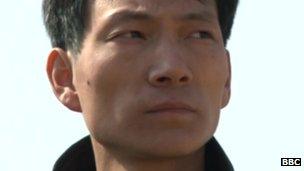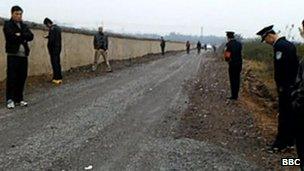Taking on China's corruption
- Published
- comments
The BBC has obtained secretly filmed video evidence that indicates a Chinese Communist Party official paid for villagers in China to be beaten up because they were refusing to move off land earmarked for development. The video also shows police refusing to prosecute the official for any serious crime.
The incident happened in the city of Weifang in Shandong province late last year. It is just one of thousands of land disputes involving local Communist officials in China every year. You can watch our report with the secretly filmed footage here.
One man's story of alleged corruption within the local Communist Party
China's Communist leaders worry that corruption within the ranks of the Communist Party is one of the greatest threats they face. Our visit to Weifang indicates how deep it goes and how hard it is to tackle in what is effectively a one-party state.
As he addressed the thousands of delegates at the opening of the National People's Congress on Monday, Premier Wen Jiabao promised to do more about corruption.
"We will resolutely rectify the problems of laws not being fully enforced, of lawbreakers not being prosecuted, and law enforcement being uncivilised and corrupt," he said. It was one of the points in his speech where he was applauded.
The premier went on: "We will work harder to build clean government. We will fight corruption and give a high priority to solving serious problems that the people are resentful about."
Secret video

Mr Tan said that local officials did not want him to publicise the case
Tan Hong Guang is not just resentful, he is incensed. He is a farmer and part-time welder from Weifang city, in the eastern province of Shandong. His family owns a tiny patch of land just three mu (0.5 acres, 0.2 hectares) in size, where they used to grow wheat and then planted fruit trees.
He is in dispute with local Communist Party bosses who are trying to take his fields, together with land belonging to many others in his village, to build a new business district.
The local Communist authorities and the police do not want him to publicise the case. But Mr Tan was so outraged by what happened to his family when they resisted the party that he began recording it all on film. He wanted to meet and show us his footage.
It begins with images shot in the dark. A small, silver van is standing in a field, its windows have just been smashed in, the glass shattered. A torch lights up an old man lying on the ground, moaning. It is Mr Tan's father. Lying next to him is Mr Tan's brother, also badly injured.
"My dad and my brother were here guarding the gate to our fields," Mr Tan explained. "On the evening of 5 November last year, thugs hired by our village's Communist Party secretary and other local leaders came and attacked them."
"My brother was inside a tent. The thugs cut it to pieces. My father was inside his car. They started smashing it and when he tried to get out, they turned on him. His hands were cut while he was trying to protect his head, and bones broken. My brother had cuts to his back. Bones in his spine were fractured."
Mr Tan took us to see the tiny, muddy patch of land at the heart of the dispute. He was nervous and afraid in case local officials or the gang who attacked his family spotted us.
Today, sitting abandoned in the field, is the smashed-up silver van, and next to it a small, red, three-wheel car which belonged to his father. It was also trashed during the attack.
Shopping malls
Gesturing at the fields, Mr Tan said: "This whole area is designated for business use. They are going to build shopping malls here, things like that. Just in our village, there are over 100 families involved in this dispute."
Standing there, you can see why the land is valuable. Just across a busy road is a brand-new local government office. It is huge, white and gleaming, many stories high. Next to it is a new police station. There is a poster showing the large concrete and glass buildings that are planned for the business district on Mr Tan's fields.
Weifang has a population of a million and it is developing fast. Giant new office towers and blocks of flats are going up all around the city. The local government profits handsomely from taking farmland and selling it on for building.
China is projected to have 100 cities of this size in the coming years and in many, there are disputes over land. It means around the country, there are tens of thousands of incidents of what is euphemistically called "unrest" every year, and land seizure lie at the heart of many of them.
Mr Tan and the villagers say the compensation the authorities are offering them is far too low. After it is developed, they say their land will be worth around 100 times what they are being offered.
But it is the way his family were assaulted that has really angered Mr Tan. He went to police to ask why the men who organised the attack were not facing serious charges, why his village's Communist Party boss was detained but then released.
Gang attack

Mr Tan managed to take secret footage of police intimidation
On Mr Tan's secret footage, a local policeman admits he knows that the village party secretary met with another local leader, and they then telephoned a known local gangster. The policeman says he also knows the village party secretary paid the thug 20,000 renminbi ($3,100, £2,000) to get a gang of men to attack Mr Tan's family.
The gangster is now in police custody. But the party secretary is back in charge of the village, a case pending against both men.
Mr Tan demanded to know why they were not facing serious criminal charges, like assault and attempted murder, and why the party secretary had been released.
On film, the policeman tells him that the two men will only face the minor charge of "picking a quarrel and making trouble", that is all that is appropriate in this case.
"The government's actions here are bad. How can we accept this?" Mr Tan said. "The government is hiring thugs to kill us. We can't live like this. I am going to Beijing to find someone higher up, because here, at the local level, they refuse to solve our problem."
But Mr Tan never made it to Beijing to press his case. Shortly after he spoke to us, he was picked up by the police, warned not to leave Weifang, and is now under constant watch by the authorities, the police protecting the local party from wider scrutiny.
It is an all too typical tale in China today. When local government, the police, the courts and the media all serve the Communist Party, there are clear conflicts of interest. Accountability is hard to enforce, and corruption hard to root out.